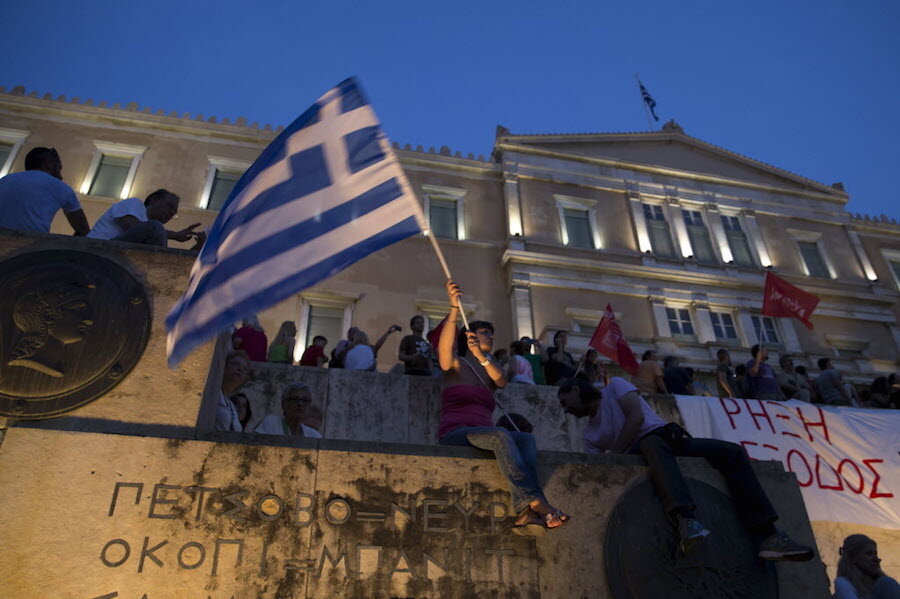Will Greece's euro fate be sealed today?
Loading...
Will Greece be able to reach an agreement with the International Monetary Fund and wealthier European nations before it defaults on a $1.8 billion IMF loan due on June 30? And what happens if it can't?
The answer to those questions could start coming as soon as today, when Eurozone finance ministers and, later in the day, heads of government and bank chiefs hold an emergency summit on Greece's debt crisis.
But will Greece's continued membership in Europe's single currency – a monetary union that none have exited thus far – be doomed if an agreement isn't reached on June 30? Almost certainly not.
The history of sovereign debt negotiations is filled with deadlines and warnings by creditors of imminent cataclysm – and defiant vows by debtors to protect national sovereignty. Yet usually an accommodation is reached. Eventually. Moreover, it's possible to kick the can down the road for a long time. The likelihood of the IMF declaring Greece in formal default on July 1, whether it pays all, something, or nothing are exceedingly low.
But Greece's financial position is indeed dire, and prolonged and testy negotiations with its creditors have only exacerbated its plight.
What are they arguing about?
The socialist government of Greek Prime Minister Alexis Tsipras doesn't want further cuts in government spending and tax increases, which the IMF and Europe are demanding. Official Greek unemployment is now at about 25 percent and government employment has been cut by 50 percent in the past few years. Tsipras says his people have suffered enough.
Mr. Tsipras' position has been that demands for more austerity will simply deepen Greece's economic hole since the value of GDP has already fallen by about 25 percent, and pensions for retired government workers have already been slashed since the crisis began in 2009. And he argues, with reason, that more austerity would be a betrayal of the voters who elected his government earlier this year.
On Sunday, there were unconfirmed reports that Tsipras was considering unspecified increases in taxes and cuts in pensions today. But details were nowhere to be found, beyond Tsipras' position that he'd agree to more belt-tightening in exchange for a hefty chunk of Greece's existing debt being written off. European leaders, led by Germany, have been reluctant to agree to that.
The $1.8 billion coming due at the end of the month is owed to the IMF. What's at stake is the last tranche of a promised bailout money – worth $8.2 billion – that the IMF and Europe could withhold if payment isn't deemed timely.
What could happen?
While a formal default on July 1 seems unlikely, there are enormous risks to Greece's enfeebled banks, particularly as panic spreads in credit markets. Greek banks experienced a wave of withdrawals last week. On Sunday Reuters reported, citing "sources in Frankfurt and Brussels," that $4.5 billion was pulled out of Greek banks last week; and that over the weekend orders were placed to take out $1.1 billion more today.
Money draining out of banks often begets more money following, and bank runs can undermine an entire system. And then there's the problem of the government paying its accountants and firemen and teachers. Printing money, since Greece belongs to the euro, isn't an option. The risks are real for Athens.
What are the odds of a deal today?
Hard to predict. The atmosphere is rancorous. After a Guardian reporter based in Brussels tweeted Sunday that Eurozone leaders had told Tsipras "he'll get debt relief, just not in this programme, but maybe wording he can take home Monday," the spokesman for Greece's finance minister responded: The Eurozone are "pathological liars promised [former Prime Minister Antonis] Samaras same debt relief in December 2012 and got us here." Samaras lost out to Tsipras in January's parliamentary election.
Last Thursday talks between the two sides collapsed completely. On Sunday, EU President Donald Tusk was more measured in his words, but just as uncompromising. "The game of chicken needs to end and so does the blame game. We are close to the point where the Greek government will have to choose between accepting what I believe is a good offer of continued support or to head towards default," he said.
Greece could yet end up out of the euro. The country's financial problems are deep and wide. But the one thing all sides have in common is fear of a terrifying unknown, namely the first crack in a currency union that began 15 years ago. If a rupture is really coming, both sides will probably delay that moment as long as possible.








